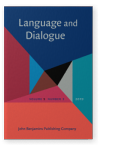Language use nowadays in Russian communication
Specifics and trends
This article presents linguistic and communicative transformations in socially significant areas of modern
communication in Russia. The authors apply a historical-comparative method as well as diachronic description and interpretation to
analyze the processes taking place under the influence of intra- and extra-linguistic factors in various Internet and media
genres, such as advertising, business and professional communication. It was found that the fusion of the features of
communication and publication, the combination of dialogue and polylogue determine the “clickbait” nature of blogs and make
blogging the most influential genre of Internet communication. The growing influence of oral speech and corporate rules in the
field of business communication underlies the trend toward agrammatism of phrases. Innovations in the field of advertising
manifest themselves on the verbal level of the slogan and its implicit influence on the recipient.
Article outline
- 1.Introduction
- 2.Materials and methods
- 3.Results
- 4.Discussion
- 4.1Blog as the leading speech genre in the Internet communication
- 4.2Advertising slogan as a form of manipulative communication
- 4.3Precedent phenomena in media communication
- 4.4Language use in business communication
- 4.5“Doctor-patient” communication: Traditions of language use and modern practice in professional communication
- 5.Conclusion
- Acknowledgements
-
References
References
Bakhtin, Mikhail
1979 Problems of Dostoevsky’s poetics. Moscow: Sovetskaya Rossiya.

Formanovskaya, Natalia
1989 Speaking Etiquette and Communication Culture. Moscow: Vysshaya shkola.

Kara-Murza, Sergej
2005 Manipulation of Consciousness. Moscow: Eksmo.

Karasik, Vladimir
2014 The Linguistic Manifestation of Personality. Volgograd: Paradigma.

Kasperova, Larisa, Natalia Klushina, Larisa Selezneva, Nadia Smirnova, and Irina Tortunova
2016 “
The impact of the Internet on genre and stylistic features of media texts.”
Global Media Journal S31, 7.

Klushina, Natalia
2018 Media Stylistics. Мoscow: Flinta.

Klyuev, Eugene
2002 Verbal Communication. Moscow: Ripol Klassik.

Kovaleva, Natalia
2001 “
Speech stereotypes of the epistolary text.” In
Text. Structure and Semantics. Reports of the 8th International Conference, 231–240. T.I.M.: SportAcadem Press.

Krasnykh, Victoria
2003 Embraced by Strangers: A Myth or Reality? Moscow: Gnosis.

Krysin, Leonid
2017 “
On the correlation of the language system, its norms and usage.”
Communication Studies 2(12): 20–31.

Kukharenko, Valeria
1988 Interpretation of the Text. Moscow: Prosveshcheniye.

Leech, Geoffrey
1983 Principles of Pragmatics. London /New York: Longman.

Lotman, Yuri
2002 History and Typology of Russian Culture. St. Petersburg: Iskusstvo.

Oxford English Dictionary
Pelevin, Viktor
2015 Generation “P”. Moscow: AST Publishing House.

Petrovskaya, Larisa
1982 Theoretical and Methodological Problems of Socio-psychological Training. Moscow: Moscow State University.

Radchenko, Irina
2007 Students’ Dictionary of Advertising Terms and Public Relations.
E. Ye. Topilskaya (ed.). Voronezh: Voronezh Branch of Moscow Humanitarian Economic Institute.

Petrov, Sergey
2018 “
Facebook has allocated $10 million to pay to community leaders of successful communities”. Federal News Agency
10 February. URL:
[URL]
del Rio, Belen, Rodolfo Vazquez, and Victor Iglesias
2001 “
The effects of brand associations on consumer response.”
Journal of Consumer Marketing 18(5): 410–425.


Selezneva, Larisa
2016 “
Discourse tonality in PR-texts.” In
Stylistics Today and Tomorrow. Proceedings of the 4th International Scientific Conference, 514–517.

Selezneva, Larisa
2017 “
Bad and good text regarding the orthologic aspect.” In
Text of Culture and Culture of the Text. Proceedings of the 4th International Pedagogical Forum, 102–107. Moscow: Russian Society of Teachers of the Russian Language and Literature.

Shiryaev, Eugene
2000 “
Types of norms and the issue of cultural and linguistic evaluations.” In
Cultural and Linguistic Situation in Modern Russia, ed. by
N. A. Kupina. Ekaterinburg: Ural University Publishing House.

Sirotinina, Olga
2013 Russian Language: The System, Language and Risks They Create. Saratov: Publishing House of the Saratov University.

Sternin, Joseph
2008 Practical Rhetoric: Textbook for University Students. 5th edition. Moscow: Academia.

Stalnaker, Robert C.
1985 “
Pragmatics.”
The New in Foreign Linguistics. Linguistic Pragmatics 161. Compiled and with an introduction by
N. D. Arutyunova and
Elena Viktorovna Paducheva (eds.). Moscow: Progress.

Toshovich, Branko
2015 Internet Stylistics. Monograph. Мoscow: Flinta.

Cited by
Cited by 2 other publications
Klushina, Natalia & Maria Vasilchenko
2022.
Current Problems of Studying Academic Communication in Contemporary Russian and English Studies. In
Science and Global Challenges of the 21st Century - Science and Technology [
Lecture Notes in Networks and Systems, 342],
► pp. 486 ff.

Mustajoki, Arto & Alla Bajkulova
This list is based on CrossRef data as of 12 january 2022. Please note that it may not be complete. Sources presented here have been supplied by the respective publishers.
Any errors therein should be reported to them.
